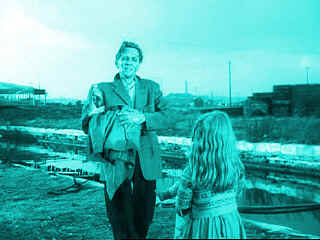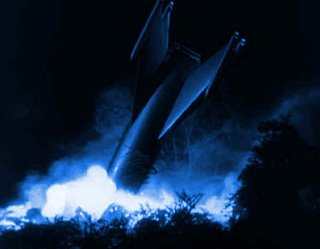 There's nothing better than an apocalypse on your doorstep
There's nothing better than an apocalypse on your doorstep
 There's a brilliant scene in 'The Quatermass Xperiment' (Buy it at amazon.co.uk here) where Victor Caroon, the last surviving member of the first British mission into space and in the process of transforming into a plant creature, is awoken from his sleep in a river barge by a seven year old Jane Asher playing with her doll. Framed by the wildness and decay of the riverbank at what is supposed to be Deptford, they are two isolated figures in a landscape, as alone as if they were the last people on earth. What you can't see in the colourised photo of this scene is the sheer sense of disarray and an area having been forgotten about. Despite being near to the centre of London, this scene seems to take place in another, more lawless and less structured country. Being the sad fantasist that I am, I couldn’t resist going down to the riverside where Deptford Creek (The River Ravensbourne) meets the Thames. It's changed out of all recognition in the eight or so years since I arrived in London, never mind since the 1950s when they were shooting Quatermass. Even when I arrived there was decaying warehouses, dark moorings and piles of rubble where the scrub pushed through. There's a small amount of the wildness left now, but enough to give me that fantasist’s thrill. Here I was, standing where the scene was supposed to have been (or near enough), early on a Saturday morning, close enough to the location and close enough to sleep to feel myself on the border between this world and the other world of spacemen and rocketships and silent dignified astronauts fighting to retain their humanity. It was the same when I lived in Surrey and read ‘War of The Worlds’ by H.G. Wells. Walking the quiet lanes and looking out over the green valleys I could almost see the great tripods striding towards London, the smell of burning flesh catching on the warm breeze and falling to the street with the ashes. There is nothing better than seeing the apocalypse on your doorstep.
There's a brilliant scene in 'The Quatermass Xperiment' (Buy it at amazon.co.uk here) where Victor Caroon, the last surviving member of the first British mission into space and in the process of transforming into a plant creature, is awoken from his sleep in a river barge by a seven year old Jane Asher playing with her doll. Framed by the wildness and decay of the riverbank at what is supposed to be Deptford, they are two isolated figures in a landscape, as alone as if they were the last people on earth. What you can't see in the colourised photo of this scene is the sheer sense of disarray and an area having been forgotten about. Despite being near to the centre of London, this scene seems to take place in another, more lawless and less structured country. Being the sad fantasist that I am, I couldn’t resist going down to the riverside where Deptford Creek (The River Ravensbourne) meets the Thames. It's changed out of all recognition in the eight or so years since I arrived in London, never mind since the 1950s when they were shooting Quatermass. Even when I arrived there was decaying warehouses, dark moorings and piles of rubble where the scrub pushed through. There's a small amount of the wildness left now, but enough to give me that fantasist’s thrill. Here I was, standing where the scene was supposed to have been (or near enough), early on a Saturday morning, close enough to the location and close enough to sleep to feel myself on the border between this world and the other world of spacemen and rocketships and silent dignified astronauts fighting to retain their humanity. It was the same when I lived in Surrey and read ‘War of The Worlds’ by H.G. Wells. Walking the quiet lanes and looking out over the green valleys I could almost see the great tripods striding towards London, the smell of burning flesh catching on the warm breeze and falling to the street with the ashes. There is nothing better than seeing the apocalypse on your doorstep. 'The Quatermass Xperiment' contains one of the most poignant and potent images of what I'm trying to capture in this blog. A sleek and beautiful rocket, a sister to the Skylon, sticks into the soil of an English meadow at almost a forty-five degree angle. There is no cordon, no helicopters, no quarantine. A van, with five men is all that is sent to retrieve it. Locals take cover in memory of the war when they hear it overhead, and then look on with an almost casual interest. There is a feeling that, for these people, a rocketship seems almost commonplace, as if they are thinking 'of course there's a rocketship'. These are people who have never had it so good. The presentation of technological marvels is an everyday occurrence to them. They are almost certain that they are living in the future. There is no reason not to expect that they belong to country who, having won the war, will go on to beat the world in whatsoever it chooses. The government and it's scientists are, in this world, working away to make the future British.
'The Quatermass Xperiment' contains one of the most poignant and potent images of what I'm trying to capture in this blog. A sleek and beautiful rocket, a sister to the Skylon, sticks into the soil of an English meadow at almost a forty-five degree angle. There is no cordon, no helicopters, no quarantine. A van, with five men is all that is sent to retrieve it. Locals take cover in memory of the war when they hear it overhead, and then look on with an almost casual interest. There is a feeling that, for these people, a rocketship seems almost commonplace, as if they are thinking 'of course there's a rocketship'. These are people who have never had it so good. The presentation of technological marvels is an everyday occurrence to them. They are almost certain that they are living in the future. There is no reason not to expect that they belong to country who, having won the war, will go on to beat the world in whatsoever it chooses. The government and it's scientists are, in this world, working away to make the future British.In this incarnation of Quatermass, Quatermass himself reflects this. Rather than the avuncular, donnish figure he is portrayed as elsewhere, in this film he is driven. When he succeeds in dispensing with the monstrous creature that Caroon eventually becomes, he walks from Westminster Abbey, the site of Carroon's final stand, and does not stop walking. He ignores those around him, determined and hard-headed; he brushes aside questions and pleas for information. He is literally the relentless march of science. He is on the way to carry on with preparations for the next launch. Nothing will stand in his way. Compassion, celebration, sadness, and guilt: all are alien to this Quatermass. He is science as destroyer, as over-reacher. Here is the steely callousness that presents more and more technology as the answer to unreliable humanity. Ruthless scientific advancement.
Interestingly, this Quatermass, played by American Brian Donlevy, is an accident of circumstance. Nigel Kneale had intended that his first Quatermass serial would be a check to the cheery post-war optimism he saw around him in the country, but it was the Quatermass of the television serial that was the motor for that. It was only in the making of the film, which Kneale didn't have direct involvement with, that it was Quatermass that became the chilling figure he is here. Donlevy, partial to the drink and used to playing hard-nosed characters made his Quatermass inflexible and unpleasant. This has the effect of shifting the anxiety away from the sympathetic Caroon whom we see suffer and fight his transmogrification, and onto the figure of Quatermass as scientist as authoritarian.






2 Comments:
I do hope you're going to write about my favourite Q - Quatermass And The Pit, and you're looking forward to Jane asher's latest turn in British sci-fi, A For Andromeda.
I'm glad I found your blog, keep it up.
11:47 am, March 21, 2006
By the way, I'll be linking to you, presently.
11:49 am, March 21, 2006
Post a Comment
<< Home